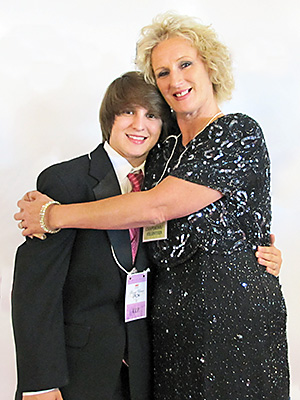
Ceara Sturgis, a graduating senior at the Wesson Attendance Center in Copiah County, Mississippi, was left out of her yearbook because she refused to wear the exposing scoop-necked drape reserved for girls and instead wanted to wear a tuxedo, as the boys did. We've filed a lawsuit on her behalf, asking that the school district be held accountable for this discriminatory decision.
One could wonder why all the fuss over a yearbook photo. Certainly the school has argued that it isn't such a big deal, asking the court to dismiss the case. But as we argue in our response to the school's motion to dismiss, it is a big deal. Schools teach their students not only "the three Rs," but also an awful lot about our shared values and what we place importance on as a society. From our filing:
When school officials exclude or deny benefits to girls who do not conform to gender stereotypes from school activities, they ratify and reinforce outdated views of the relative qualities of men and women. The District inflicted harm on Ceara by sending her the message that her "masculine" appearance was so unacceptable that she was literally not fit to appear alongside her fellow classmates' official photos in the yearbook.
Moreover, the fact that the central dispute here concerns a yearbook photo makes the controversy not one that is beneath the federal courts, but one that resonates with almost all Americans. Yearbooks are part of American life, a rite of passage for students completing high school and entering adulthood. For many students, a senior yearbook portrait is the first time their image ever appears in a book, and for many others, it will be the only time that happens in their entire lives.
By excluding Ceara from her yearbook, the school sent a message to all of their students that if they do not rigidly adhere to some administrator's notion of an "acceptable" appearance for their gender, they can be deemed unworthy of inclusion in the fundamental experiences of high school life. That male students must be "masculine enough" and female students "feminine enough" and those students who fail to live up to the standard are somehow less than everyone else. This message couldn't have been communicated more clearly if Ceara's principal had brought her onstage during a school assembly and called her a freak.
This is not what we, as Americans, believe our schools should be teaching young people. We believe that schools should teach our children that they all have inherent worth, and that they should be judged by their actions and the effort they put into learning, not by how they express their gender identity. Sex discrimination is simply not an American value.
In this case, a yearbook photo — or lack of one — says a lot. For the sake of future students of Copiah County, we hope Ceara's case will result in schools that teach that all students are worthy of respect, no matter how they look, what they wear or how masculine or feminine they are.

